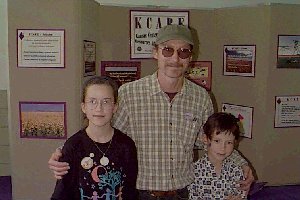 It
was one of those little comments that you might let slip away because you're
thinking about the next task, but it sunk into some level of my consciousness,
deeper than the desperate quarter inch of rain had soaked into the dry,
baked Kansas soil that morning. It was Michael, my ten year old (going
on 18), who was dropping acorn squash seeds into the holes I had just hoed
in the dust below the layer of moisture from the morning shower.
It
was one of those little comments that you might let slip away because you're
thinking about the next task, but it sunk into some level of my consciousness,
deeper than the desperate quarter inch of rain had soaked into the dry,
baked Kansas soil that morning. It was Michael, my ten year old (going
on 18), who was dropping acorn squash seeds into the holes I had just hoed
in the dust below the layer of moisture from the morning shower.
"When I grow up I'm going to be an organic farmer just like my Dad. It's a lot of hard work, but it's a good example for your kids."
"Great," I said, the impact of what he had just said only beginning to feed enthusiasm into my voice. "You can have this place. You won't have to start from scratch."
I don't know if it will really happen that way, but both my kids (for whom Sandheron Farm is named, after all, a combination of their middle names,Sandina and Heron) go back and forth between wanting to live here the rest of their lives and wanting to go out and be a rock star, a baseball star, a doctor, and/or a writer. But it is nice that they see the homestead as a desirable option, that they love this place, and that they have a sense of responsibility toward the land.
My dad was a medic, a roughneck,
a salesman, and finally a mid-level manager in a ruthless, evil capitalist
corporation that ultimately ate him alive. My mom was a saleswoman, a mom,
and a retail clerk. We lived in small towns and suburbs, but the farm life
was a generation removed from me; my Grandma was the last one who had grown
up on a farm. And yet, in the spirit of the sixties, I had somehow become
attracted to the idea of being a farmer, listing that as my life goal in
a bio for the program of my high school's Junior play, "You Can't Take
it With You," in which I played a supporting
role. Of course I also wanted to
be a rock star, a baseball star, a doctor, and/or a writer. Such is the
nature of youth.
It wasn't until the mid-seventies
that I stumbled upon the School of Homesteading, as I searched for a viable
way to escape the decaying civilization in which I had been raised, a civilization
for which I had
developed a deep and permanent hatred
because of the destruction it had wreaked on the People and the Planet.
I just somehow hadn't been convinced that TV, polyester, and unimaginable
wealth for the few was a desirable or even acceptable tradeoff for genocide
and ecocide. So I landed at Maynard and Sally's doorstep, a disgruntled
idealist with a desire for radical change and very few practical skills.
Sally, of course, initially thought
I was going to be a very difficult case. She told me later that there are
some people that she initially had trouble feeling comfortable with, but
later found them to be true friends. Maynard, on the other hand, came to
realize what an obstinate ideologue I could be only later, as we engaged
in philosophical and ontological debates. Initially, I think, he just saw
me as another culturally deprived suburban kid who didn't know a heifer
from a steer, just like 90% of the other
students who came to learn the lost
skills of homesteading.
Was it only six months? Like other
graduates in other years, for the eight of us in the Class of 1976 they
were six months that changed the world. Not all of us are homesteading
today. Wendy and Dennis have been faithful, and I guess what I am doing
is pretty close. I've lost track of many of the
others, so I can't speak of their
lifestyles. But it wasn't just about "lifestyle." It was about connections,
and I still feel those connections today, 22 years after the days of morning
chores, breakfast jokes, scooping windrows of hay onto wagons, and picking
green beans for market in the hot summer sun (which I look forward to doing
again this year) with friends who still feel like my brothers and sisters.
Only six months? No. It was, it is a lifetime. And just as sure as it will
eventually rain, it is part of my
children's lifetime, too, and will
be part of their children's, and theirs, and on as long as the grass will
grow, the sun will shine, and the wind will blow.
Stu can be reached at sandheron@earthlink.net
Back to Homesteading, a Compilation